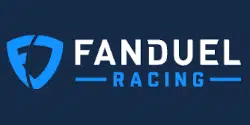Virginia Horse Racing Betting
Virginia is home to a modest but well-rounded horse racing industry consisting of multiple race tracks, off-track betting parlors (OTBs), and advance deposit wagering websites (ADWs).
The Virginia Racing Commission regulates live horse racing and pari-mutuel wagering in the Commonwealth. Its duties include promoting, growing, and protecting the integrity of all Virginia horse racing and wagering activities.
Legal Virginia horse racing betting is available to fans 18 or older, while historical horse racing machines at tracks and OTBs enforce a minimum age of 21 to play.
Virginia Horse Racing Betting Sites
 $200 Welcome BonusTwinSpires Offer Code: BET200
Terms Apply
$200 Welcome BonusTwinSpires Offer Code: BET200
Terms Apply
 $500 No Sweat First BetFanDuel Racing Promo Code: Not Needed
Terms Apply
$500 No Sweat First BetFanDuel Racing Promo Code: Not Needed
Terms Apply
Virginia Online Horse Racing Betting
Advance deposit wagering is legal and regulated in Virginia. Fans 18 or older can bet on horse races in Virginia with licensed and highly experienced ADWs, including:
Online Racebooks in Virginia
The Virginia Racing Commission (VRC) regulates advance deposit wagering, issues licenses to online racebooks, and monitors operators for compliance with all state laws.
VA Code § 59.1-369.5 requires Virginia racing betting sites to apply for licenses from the VRC before offering their services within the Commonwealth. Additional regulations under 11 VAC 10-45 outline the licensing process and suitability standards Virginia ADWs must meet before qualifying for online betting licenses.
Licensed Virginia horse racing betting sites must also allow the VRC to inspect and monitor their “equipment, staff, and records” to ensure compliance with all consumer protection regulations.
Note: Every online racebook recommended on this page holds a Virginia advance deposit wagering license. BettingUSA strongly recommends readers to use licensed ADWs exclusively because the VRC provides effective consumer protection oversight.
For example, 11 VAC 10-45-40 requires each online racebook to submit a copy of its terms of use to the VRC for prior approval. In addition, Virginia pari-mutuel wagering regulations require licensed betting sites to record all transactions and communications with their customers.
Virginia Horse Racing Tracks and Locations
There are three live race tracks in Virginia. One hosts thoroughbred races, another holds harness racing, and the third hosts two annual steeplechase races.
Fans 18 and older may place pari-mutuel wagers at the track on most live racing events in Virginia.
Colonial Downs Racetrack
10515 Colonial Downs Parkway
New Kent, Virginia 23124
Colonial Downs Racetracks holds live thoroughbred races from July through September. Standard race days are Mondays, Tuesdays, and Wednesdays. In addition, Colonial Downs hosts non-wagering steeplechase races on Monday before regular thoroughbred race cards.
General admission is free and provides access to a ground-level outdoor trackside view. Visitors may also pay to reserve grandstand seats, boxes, and indoor seating with dining options.
Colonial Downs also provides simulcast wagering on races held nationwide. Additionally, the attached Rosie’s Gaming Emporium offers 600 historical horse racing machines and another dining option for visitors 21 or older.
Colonial Downs stopped hosting races after the 2013 season and surrendered its license in 2015 following a protracted dispute with the Virginia Horsemen’s Benevolent and Protective Association (HBPA).
However, the track resumed racing in 2019 after Virginia legalized historical horse racing machines, which attracted investments from experienced track operators and led to a renewed agreement with local horsemen. Churchill Downs Incorporated acquired Colonial Downs and six of its associated Rosie’s Gaming Emporium locations in 2022, with plans to build up to five more historical horse racing facilities.
Great Meadow Steeplechase Course
5089 Old Tavern Road
The Plains, Virginia 20198
The Virginia Gold Cup Association holds two annual steeplechases at Great Meadow. It hosts the Virginia Gold Cup each May and the International Gold Cup every October.
Spectators can bet on both races at wagering stations located around the grounds at Great Meadow.
Shenandoah Downs
300 Fairground Road
Woodstock, Virginia 22664
Shenandoah Downs at the Shenandoah County Fairgrounds holds live harness races every Spring from April through May and every Fall from September through October or November.
Parking and admission are free, and the track offers pari-mutuel wagering. Minors may accompany adults at the track, but bettors must be 18 or older.
Major Virginia Horse Racing Events
Virginia is not a high-profile horse racing destination, but it is home to several notable horse races:
- Virginia Derby (G3): $300,000 purse, open to 3yo thoroughbreds, held at Colonial Downs
- Virginia Oaks: $200,000 purse, open to 3yo fillies, held at Colonial Downs
- Virginia Gold Cup: Steeplechase stakes race, one of Virginia’s largest outdoor events, attracts 65,000+ spectators
- International Gold Cup: Steeplechase stakes race, held at Great Meadow, regularly attracts 35,000+ spectators
Virginia Off-Track Betting Locations
Virginia is home to several off-track betting parlors (OTBs).
Most Virginia OTBs are attached to gaming emporiums with historical horse racing machines that look like slots but use past races to determine the results of every spin. In addition, two sports bars hold off-track betting licenses to offer simulcast wagering.
- Breakers Sports Grille: 9127 W Broad Street, Henrico
Simulcast wagering is offered at this sports bar restaurant. - Buckets Bar & Grill: 228 North Battlefield Boulevard, Chesapeake
Buckets houses an exclusive off-track betting room. However, simulcast wagering is available throughout the restaurant. - Rosie’s Game Room: 2360 Virginia Avenue, Collinsville
This VA OTB also hosts 37 historical horse racing machines. - Rosie’s in Dumfries: 18069 E Triangle Shopping Plaza, Dumfries
Rosie’s Gaming Emporium in Dumfries has 150 historical horse racing machines, simulcast wagering, a restaurant, and bar. - Rosie’s in Hampton: 1996 Power Plant Parkway, Hampton
Simulcast wagering, 700 historical horse racing machines, a restaurant, and bar are available at the Rosie’s Gaming Emporium in Hampton. - Rosie’s in Richmond: 6807 Midlothian Turnpike, Richmond
In Richmond, Rosie’s Gaming Emporium has two restaurants, including a sportsbook restaurant featuring 29 TVs and a 28’ projector screen. There are also 700 historical horse racing machines and simulcast betting. - Rosie’s in Vinton: 1135 Vinyard Road, Vinton
The Vinton location offers simulcast wagering and 500 historical horse racing machines, including a high-limit area. - Rosie’s in Emporia: 700 W Atlantic Street, Emporia
Virginia Horse Racing Betting Law
Legal horse racing betting came to Virginia in 1988 after voters approved pari-mutuel wagering in a public referendum. Additional legislative efforts led to Virginia legalizing off-track betting and advance-deposit wagering apps.
In 2018, Virginia passed HB 1609 to legalize historical horse racing machines at race tracks and their associated OTBs. The legislature clearly had Colonial Downs in mind when crafting the bill because it was the only track that met the qualifications to install HHR machines at its properties.
At the time, Colonial Downs hadn’t held a live race since 2013. The track and its associated OTBs launched their first HHR machines in 2019.
Virginia law enforces a minimum age of 18 to participate in pari-mutuel wagering and 21 to place wagers on historical horse racing machines.
Key Virginia Horse Racing Betting Laws and Regulations:
- Code of Virginia Horse Racing Laws: VA Code § 59.1
- Virginia Horse Racing Regulations: 11 VAC 10
- Virginia HHR Regulations: 11 VAC 10-47

